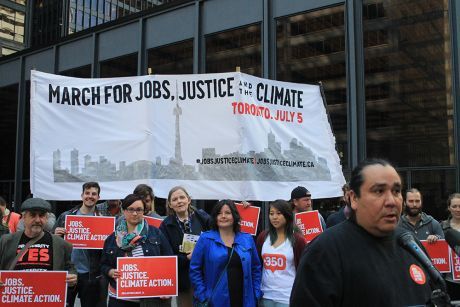Reports
You are here
Justice, jobs and climate rally launch

May 22, 2015
On May 21 in the heart of Toronto’s financial district, representatives of the growing climate justice movement launched the mobilization for the July 5 March for Jobs, Justice and the Climate.
To ground the event in Indigenous tradition, 350.org organizer Clayton Thomas-Muller sang a customary calling of the spirits and waved a smoking sweetgrass braid before introducing Idle No More campaigner Wanda Nanabush.
She reminded the crowd that Toronto sits on indigenous land and is home today to over 90,000 Indigenous people. She said “All the land in Canada is indigenous land, shared with all who come here.” She emphasized that Indigenous peoples need to be at the forefront of this movement because they are the first to experience the negative effects of climate change and also because they are the sources of strategies for future sustainability—because of their intimate knowledge of the land. Indigenous peoples are putting their bodies on the line every time they have to deal with floods from hydro dams or cancer from tar sands extraction. Seventy per cent of uranium is located on indigenous territories. She noted, “Idle No More has included women, two-spirited people and youth, whose voices have not always been heard before… Indigenous people are here for you; will you stand for us?”
Jody Chan from the University of Toronto’s Fossil Fuel Divestment campaign pointed out that over 300 schools in North America take part in the campaign and that its demands are increasingly being taken up in places like the UK. She stated “Students want equality…Give power to the people and show solidarity with indigenous groups.”
Syed Hussan, from No One Is Illegal, emphasized that the struggle has to be grounded in indigenous struggles, decolonization and opposition to capitalism. He noted that indigenous struggles take place every day around the world, clearing a path of resistance.
Melina Laboucan-Massimo from the Lubicon Cree, and also a Greenpeace campaigner, spoke about the massive pipeline oil spill that devastated her community in 2011. There was insufficient emergency preparedness on the part of the provincial and federal governments, and it took five days after the election that year for the spill to be announced to the general public. “In the future, First Nations can no longer be sacrificed. We need a green, just economy. Stop the tar sands,” she stated. In defence of a just transition for the working class she noted, “Workers shouldn’t have to leave their families for three weeks at a time. We do have alternatives and lots of skilled workers who could be employed in the solar industry, like in Germany.” This summer, a solar installation will be made in Lubicon territory. She said, “We should aim high, for a 100 per cent renewable energy economy. (Solar) Panel by panel we will show the government what true leadership is.”
Well-known activist author Naomi Klein cheered the fact that the coalition organizing for the July 5 march represents marginalized people, Indigenous peoples, the largest private sector union—all united by what we have in common. This is a new kind of movement that recognizes that time is short and what unites us is more important that what divides us. She said people across Canada are tired of many things: “of seeing dollars for social programs being cut whether industry profits go up or down; tired of extreme weather; tired of exploding trains and pipelines; tired of Indian Affairs extinguishing indigenous rights; tired of the department of Foreign Affairs allowing Canadian mining companies to violate human rights worldwide; tired of the Harper lies of the ‘choice’ between jobs and social programs vs. the environment.” She pointed to Germany, which has a huge amount of renewable energy and has created 400,000 jobs in the sector.
The last speaker was Jerry Diaz, president of UNIFOR, whose membership includes, among many others, workers in the oil and gas industries. He reiterated the assertions of other speakers that “we don’t buy into the false choice between jobs and the environment… We need a sustainable strategy for renewable energy. There will be no justice unless solutions are worked through with Indigenous people worldwide.” He castigated Canada’s abysmal environmental reputation, pointing out that emissions targets set for 2020 have now been moved back to 2030. He commended the Ontario government for a recent commitment to convert a coal plant to a factory to make solar panels.
Participants at the press conference/rally also had lots to say. Ruth Gill from the Scarborough Bitumen-Free Future group said she supports the need to increase educating the public about climate change and about Enbridge’s Line 9 “which goes through Toronto across many rivers that feed our drinking supply. Equipment for water treatment cannot tackle benzene (in dilbit), leaving the water toxic. In the event of a pipeline spill we would see an evacuation like they had in Kalamazoo.”
Emmay, from the People’s Climate Movement said now is a critical moment in our history, to move forward to build a clean economy. “I want to see solutions that match the scale of the problem instead of the dearth of leadership we are seeing by the government now.” She hopes that July 5 will see lots of people take to the streets, and that the day will see a brighter future, one that is inclusive and equitable.
All out July 5! See http://jobsjusticeclimate.ca for more information.
Section:









